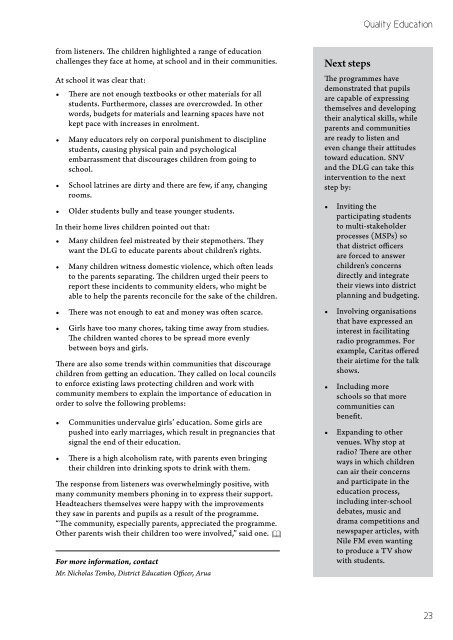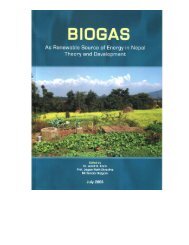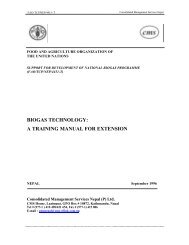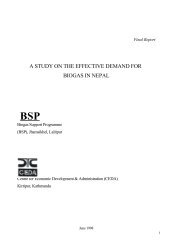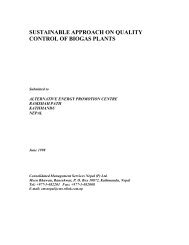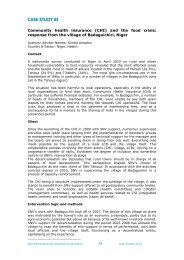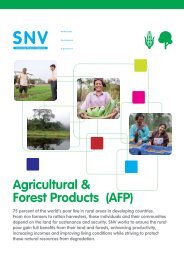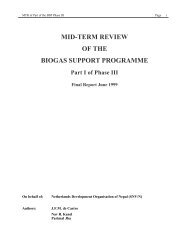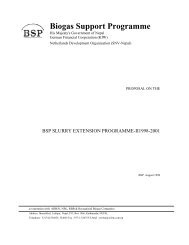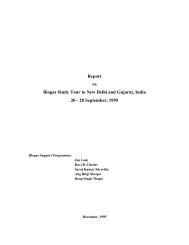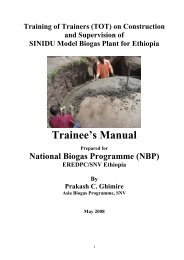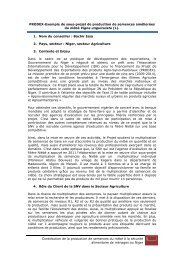School Priorities - SNV
School Priorities - SNV
School Priorities - SNV
You also want an ePaper? Increase the reach of your titles
YUMPU automatically turns print PDFs into web optimized ePapers that Google loves.
Quality Education<br />
from listeners. The children highlighted a range of education<br />
challenges they face at home, at school and in their communities.<br />
At school it was clear that:<br />
• There are not enough textbooks or other materials for all<br />
students. Furthermore, classes are overcrowded. In other<br />
words, budgets for materials and learning spaces have not<br />
kept pace with increases in enrolment.<br />
• Many educators rely on corporal punishment to discipline<br />
students, causing physical pain and psychological<br />
embarrassment that discourages children from going to<br />
school.<br />
• <strong>School</strong> latrines are dirty and there are few, if any, changing<br />
rooms.<br />
• Older students bully and tease younger students.<br />
In their home lives children pointed out that:<br />
• Many children feel mistreated by their stepmothers. They<br />
want the DLG to educate parents about children’s rights.<br />
• Many children witness domestic violence, which often leads<br />
to the parents separating. The children urged their peers to<br />
report these incidents to community elders, who might be<br />
able to help the parents reconcile for the sake of the children.<br />
• There was not enough to eat and money was often scarce.<br />
• Girls have too many chores, taking time away from studies.<br />
The children wanted chores to be spread more evenly<br />
between boys and girls.<br />
There are also some trends within communities that discourage<br />
children from getting an education. They called on local councils<br />
to enforce existing laws protecting children and work with<br />
community members to explain the importance of education in<br />
order to solve the following problems:<br />
• Communities undervalue girls’ education. Some girls are<br />
pushed into early marriages, which result in pregnancies that<br />
signal the end of their education.<br />
• There is a high alcoholism rate, with parents even bringing<br />
their children into drinking spots to drink with them.<br />
The response from listeners was overwhelmingly positive, with<br />
many community members phoning in to express their support.<br />
Headteachers themselves were happy with the improvements<br />
they saw in parents and pupils as a result of the programme.<br />
“The community, especially parents, appreciated the programme.<br />
Other parents wish their children too were involved,” said one. <br />
For more information, contact<br />
Mr. Nicholas Tembo, District Education Officer, Arua<br />
Next steps<br />
The programmes have<br />
demonstrated that pupils<br />
are capable of expressing<br />
themselves and developing<br />
their analytical skills, while<br />
parents and communities<br />
are ready to listen and<br />
even change their attitudes<br />
toward education. <strong>SNV</strong><br />
and the DLG can take this<br />
intervention to the next<br />
step by:<br />
• Inviting the<br />
participating students<br />
to multi-stakeholder<br />
processes (MSPs) so<br />
that district officers<br />
are forced to answer<br />
children’s concerns<br />
directly and integrate<br />
their views into district<br />
planning and budgeting.<br />
• Involving organisations<br />
that have expressed an<br />
interest in facilitating<br />
radio programmes. For<br />
example, Caritas offered<br />
their airtime for the talk<br />
shows.<br />
• Including more<br />
schools so that more<br />
communities can<br />
benefit.<br />
• Expanding to other<br />
venues. Why stop at<br />
radio? There are other<br />
ways in which children<br />
can air their concerns<br />
and participate in the<br />
education process,<br />
including inter-school<br />
debates, music and<br />
drama competitions and<br />
newspaper articles, with<br />
Nile FM even wanting<br />
to produce a TV show<br />
with students.<br />
23


